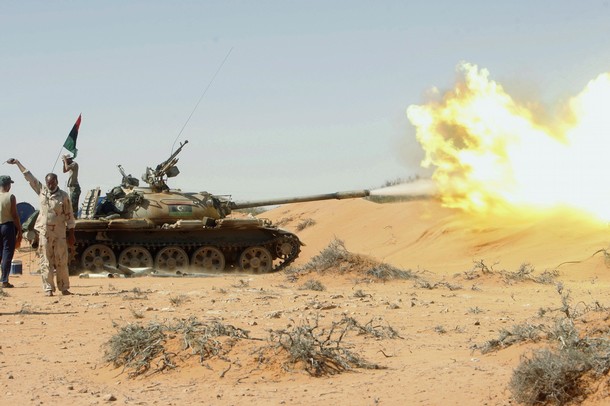
From Steven Erlanger, the New York Times: The war in Libya may be one of those quietly telling moments in the history of more important nations. For the first time, the United States has taken a secondary role — “leading from behind,” if “leading” is even the right word — in a war prosecuted by the NATO alliance and driven by Britain and France, the two strongest military powers in Europe.
But oh what a war! More than six budget-busting months against one of the weakest militaries in the world, with shortages of planes, weapons and ammunition that were patched over by the pretense that NATO was acting simply to “protect civilians,” when it was clear to everyone that the alliance was intervening on one side of a civil war. All resemblances to the Kosovo war, of course, are a priori inadmissible. That was the war — 78 days of bombing Serbia and thousands dead before Slobodan Milosevic finally capitulated — when NATO said: “Such a success, never again!” Yet here we are — with the “responsibility to protect” the new mantra, replacing Kosovo’s “humanitarian intervention.” Both are debatable, given the failure to intervene in the separatist Russian republic of Chechnya then and Syria, Bahrain or Yemen now. . . .
Libya may be a dark model for NATO’s future: internal coalitions of the willing, hemmed in by conditions and national “caveats,” running out of ammunition and targets, with inadequate means to achieve stated political goals.
The economic crisis has only exacerbated Europe’s unwillingness to live up to its grand ambitions to play a global role in foreign and defense matters. The biting complaints of Robert Gates, the former United States defense secretary, about the fading of Europe and a “dim if not dismal future” for an increasingly “irrelevant” alliance, were only an echo, if said more harshly, of similar speeches that many NATO secretaries general have made before him. . . .
There is also the moral question. In Libya, NATO allies ran roughshod over the United Nations Security Council resolution authorizing military means to protect civilians — not intervention on one side of a civil and tribal war. France and Britain dismiss that argument, saying that it is trumped by the defense of Benghazi and the need to remove Colonel Qaddafi from power and that every Qaddafi supporter with a weapon was a threat to civilians, even if they themselves were civilians.
But there is no example of NATO intervening to protect civilian supporters of Colonel Qaddafi from the rebels. And a strong case can be made that the commitment to the “sideshow” of Libya has meant the impossibility of getting Russia and China to act even with economic sanctions on Syria, where the moral argument and the “responsibility to protect” civilians is clearer.
The Atlantic alliance, like the European Union, is suffering from a predictable post-Soviet hangover, combined with the strains of rapid expansion to countries that have sharply divergent views about Moscow, Ukraine, Georgia, the Middle East and the real threats to Europe. NATO leaders, in their latest strategic doctrine, tried to find credible threats to Europe from matters like piracy, when the real rationale for the organization vanished along with the Soviet tanks along the Elbe.
Steven Erlanger is the Paris bureau chief of The New York Times. (photo: Reuters)
Image: reuters%209%205%2011%20Rebel%20tank.jpg
